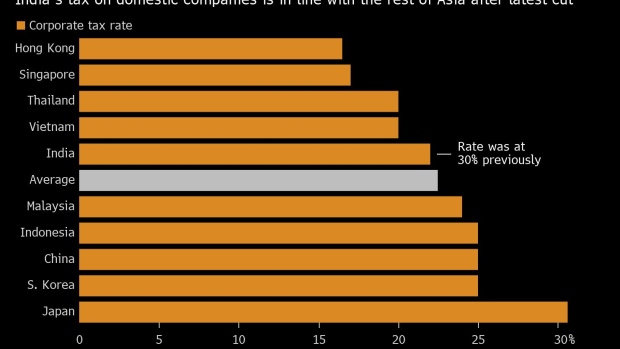Oct 21, 2019
Taxing the Rich to Fund Welfare Is the Nobel Winner’s Growth Mantra
, Bloomberg News

(Bloomberg) -- How do you spur demand in an economy? By raising direct taxes and distributing the money among the poor, says this year’s winner of the Nobel prize for economics.
Reducing taxes to boost investments is a myth spread by businesses, says Abhijit Banerjee, who won the prize along with Esther Duflo of the Massachusetts Institute of Technology and Michael Kremer of Harvard University for their approach to alleviating global poverty. “You are giving incentives to the rich who are already sitting on tons of cash.”
Countries from China to India to Indonesia are slashing taxes for businesses to spur growth amid a gloomy outlook for global economic expansion. The International Monetary Fund this month made a fifth-straight cut to its 2019 global growth forecast, pegging it at 3%.
“You don’t boost growth by cutting taxes, you do that by giving money to people,” Banerjee said in an interview Monday, suggesting that cash in the hands of the poor will drive consumption. “Investment will respond to demand.”
China earlier this year rolled out tax cuts worth $280 billion on personal income and corporate profits, while India surprised with a $20 billion stimulus, taking its corporate tax rate to among the lowest in Asia. Indonesia also plans to lower tax on companies to 20% from 25%.
MIT Professor Banerjee spoke in New Delhi where he was promoting his book ‘Good Economics for Hard Times.’
Last year, U.S. President Donald Trump unveiled a $1.5 trillion tax package, and has promised “very substantial” tax cuts in 2020 for “middle-income” Americans.
It’s the widening inequality in developed countries such as the U.S. that has angered people and pushing the world into a trade war, Banerjee said. “It is unbelievable that in the name of growth you have allowed inequality to explode to this point.”
India Slowdown
Growth in India, Asia’s third-largest economy, has slumped to a six-year low as consumption is weak, prompting the central bank to cut interest rates to the lowest in almost a decade.
The government complemented the monetary policy easing with a series of measures to reverse the demand slowdown. Those steps -- including scrapping a tax on foreign funds to allowing concessions on vehicle purchases -- have raised concerns of a fiscal slippage.
“Given the demand slump it’s not a bad thing for the government to be expansionary,” Banerjee said. “If we want to stimulate demand and corporate tax cut doesn’t do that, which is my prediction, then what do we do.”
To contact the reporter on this story: Vrishti Beniwal in New Delhi at vbeniwal1@bloomberg.net
To contact the editors responsible for this story: Nasreen Seria at nseria@bloomberg.net, Karthikeyan Sundaram, Subramaniam Sharma
©2019 Bloomberg L.P.